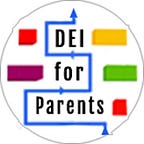How to Respond to Kids’ Disability Curiosity
Raising a DEI-Minded child.
Kids who haven’t been exposed to someone with a disability are naturally curious and need to ask questions. When they’re shushed or ignored, their instinct to learn is squashed.
The good news is that by learning how to answer your child compassionately and accurately, you’ll be contributing to the progress of becoming a truly inclusive society.
The suggestions in this article are meant to help you answer the hard questions and guide your child toward embracing kindness and respect for disabled people.
Give simple and direct answers
In general, people with disabilities want to be accepted as equal human beings and don’t want to be viewed as objects of pity. They admire parents who take the time to educate their children about disability awareness and equality.
The best way to teach your child about disability is to keep your answers simple and direct. Really listen to what your child is asking so they know their question is worthy of your full attention. If you don’t know the answer, be honest and google it together.
If you dodge the question, your child will likely get the impression that there’s something inherently evil about the subject and it shouldn’t be talked about.
One of the risks here is that your child will fill in the blanks of missing information with a myth or stereotype. Instead, offer a simple, straightforward answer.
Just as important as ‘not dodging questions’ is providing answers that are simple. Kids learn by processing the information we give them. The simpler the answer to their question, the easier it is for them to process the information. They don’t need any information beyond what they’re specifically asking.
So if your child asks “Can people in wheelchairs drive cars?” The only response you need to provide is “Yes special cars allow people who can’t use their legs to use hand controls instead.” You don’t need to offer any explanation beyond that.
The goal is to provide simple responses that both answer the question directly and also promote human rights.
Learn the best answers to common questions
If your child hasn’t already met someone with a disability, it’s more than likely they will at some point.
The way that you answer their question(s) is likely to affect how your child thinks about disabilities and treats others as they grow up.
Also, be prepared to field questions at potentially embarrassing moments. As every parent knows, kids are unpredictable and often ask embarrassing questions in public.
Here are some sample responses to common questions:
Are disabilities contagious?
“No disabilities are not contagious. They’re not like the flu or a cold that you can catch from someone else.”
Why do they act like that?
“Because part of their brain isn’t the same as ours. That part of their brain is sending signals that makes them act differently.”
Why don’t they go to our school?
“Some kids do better in a special school that can give them extra help with reading, writing, walking, talking, and playing with other kids.”
Why doesn’t that person talk like us?
“They probably have trouble with the muscles that make it possible to talk like other people.”
Are they retarded or something?
“First, ‘retarded’ isn’t a nice word. Please say mentally disabled instead. To answer your question, their brain functions differently, so they have a harder time talking and learning than most people do. But other than that, they’re just like you and me. Being a little different is actually pretty cool.”
Why did that happen to them?
“Some people are born with disabilities, and others get hurt or sick and become disabled later in life. They didn’t do anything to deserve the disability. It’s just a part of life.”
Are they going to live to be a grown-up?
“We can’t know the answer for sure. But I bet their doctor and parents are working hard to make sure they can grow into an adult.”
Do you think that person is a parent?
“It’s possible. They might even have a little girl or boy at home that’s just like you!”
Why is that person in a wheelchair?
“Their body is different from ours and they need to use a wheelchair to get around. There isn’t anything wrong with being different.”
Why can’t they walk like we do?
“You’re right. They walk differently than we do. There lots of different medical reasons that control how someone walks.”
Can learning disabilities be cured?
“Learning disabilities cannot be cured completely, but identifying the problem early can lessen its effects.”
How do people take care of themselves and get around if they’re blind?
“People who can’t see find lots of different ways to do the everyday activities just like you and me.”
Many questions and concerns can and should come up as your child encounters people with disabilities. Let them know, repeatedly, that they can come to you anytime.
If it’s important to them, it’s important to you. Look them in the eyes when you say this.
Keep the conversation going as the weeks unfold after your child asks a question or comes to you with a concern. Discussing disability equality is not a formal, once-and-done conversation. Encourage your child to keep asking questions.
Integrate as many ongoing, casual conversations about disability equality as you can into your daily life.
Originally published at https://www.deiforparents.com
